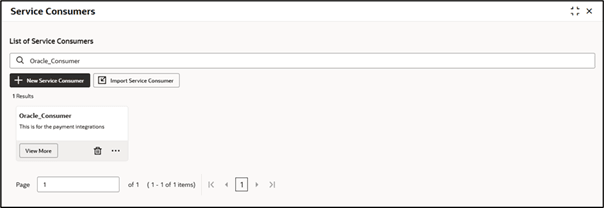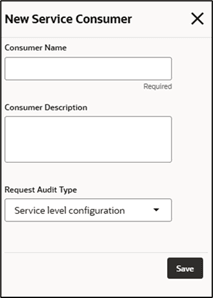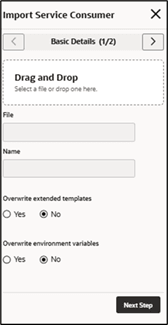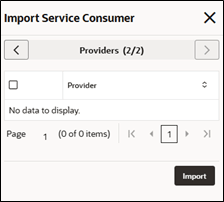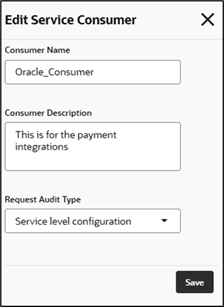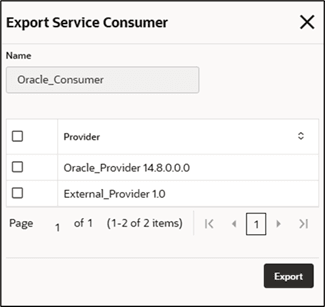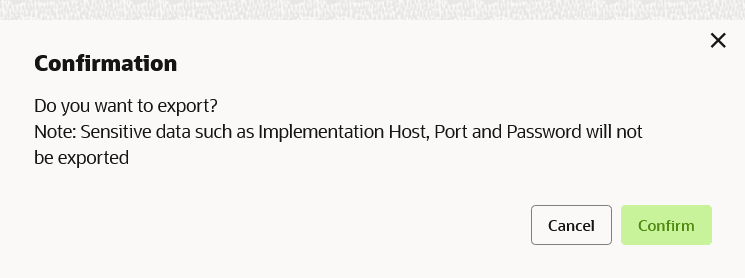2 Service Consumers
This topic describes the systematic instructions to configure the service consumers.
- On Home screen, click Core Maintenance. Under Core Maintenance, click Routing Hub.
- Under Routing Hub, click Service Consumers. The Service Consumers screen displays.
New Service Consumer
The users can create Service Consumers manually.
- Click New.The New Service Consumer screen displays.
- On New Service Consumer screen, specify the
fields.
Note:
The fields marked as Required are mandatory.For more information on fields, refer to the field description table.
Table 2-1 New Service Consumer - Field Description
Field Description Consumer Name Specify a unique service consumer name. Note:
- Enter 0 to maximum of 255 characters.
- No numeric value at beginning and no space allowed.
Consumer Description Specify the description of the consumer name. Note:
- Enter 0 to maximum of 100 characters.
- No space allowed at beginning or ending of the characters.
Request Audit Type Select the Audit type from the drop-down list. The available options are:- All Requests - All requests are logged in the OBRH and can be viewed later for debugging.
- Service level configuration - Option has been provided at consumer services for enabling audit of requests for specific Consumer Services. Audit type should be configured as “Service level configuration” and audit option at “Consumer Services” should be selected for Consumer Services which need to be audited. Monitoring dashboard does not provide the data for requests which are not being audited.
- None - Disables the audit completely. Audit logs cannot be reviewed later and monitoring dashboard does not provide the data
- Click Save to save the details.
Import Service Consumer
The user can create a service consumer by importing the JSON file and manually selecting the service providers or select all providers that needs to be imported. The user can also import zip file in order to import all the configuration JSON files together.
- Click Import.The Import Service Consumer screen displays.
Figure 2-3 Import Service Consumer - Basic Details
- Specify the fields on Import Service Consumer - Basic
Details screen.
Note:
The fields marked as Required are mandatory.For more information on fields, refer to the field description table.
Table 2-2 Import Service Consumer - Basic Details - Field Description
Field Description File Click Select to select the file. Note:
Only one file can be selected, and it must be in JSON or ZIP format.Name Specify the name of the service consumer. Note:
- Name cannot be blank and required only for JSON file.
- Enter 0 to maximum of 255 characters.
- No numeric value at beginning and no space allowed.
Overwrite extended templates Select the respective radio button to overwrite the extended templates. The available options are: - Yes - This option overwrites the extended templates.
- No - This option retains the existing extended templates.
Overwrite environment variables Select the respective radio button to indicate whether environment variables (JSON file) should overwrite existing environment variables or not. The available options are: - Yes - This option overwrites the environment variables.
- No - This option retains the existing environment variables.
Providers Displays the list of service providers names that are present in JSON file only. - Click Next on the Basic Details
screen.The Import Service Consumer - Providers screen displays.
Figure 2-4 Import Service Consumer - Providers
- Specify the fields on Import Service Consumer -
Providers screen.
Note:
The fields marked as Required are mandatory.For more information on fields, refer to the field description table.
Table 2-3 Import Service Consumer - Providers - Field Description
Field Description Providers Displays the list of service providers names that are present in JSON file only. - Click Import to import the selected service consumer file.
View / Edit Service Consumer
The user can view or modify consumer details.
- On the Service Consumer tile, click View
More button and then click Edit Service
Provider.The Edit Service Consumer screen displays.
- Click Save to save the modified consumer details.
Delete Service Consumer
The user can delete the Service Consumer.
- On the Service Consumer tile, click
Delete icon.The Confirmation screen displays.
- Click Confirm to delete the service consumer.
Export Service Consumer
User can export the consumer configuration as JSON file. The option for Export is provided to move the configurations from one environment to another.
- On Service Consumer tile, click Operation Menu (3
dot icon) and then click Export.The Export Service Consumer screen displays.
Note:
- The user has an option to select the service providers from the list which needs to be exported or can click on select all for all service providers.
- The JSON Export feature exports below data:
- Selected service consumer
- All consumer services
- Selected service providers with services
- All implementations of selected service providers with services (without Host, Port and Authentication Password)
- All transformations
- All routes
- Select the required service providers and click Export.The Confirmation screen displays.
- Click Confirm to export the service consumer in JSON file.
Configuration Export
- On Service Consumer tile, click Operation Menu (3
dot icon), and click Configuration.The Configuration screen is displayed.
Note:
Refer to Configuration topic for the screen and field description.
Request Audit
- On Service Consumer tile, click Operation Menu (3
dot icon), and click Request Audit.The Request Audit screen is displayed.
Note:
Refer to Request Audit topic for the screen and field description.
